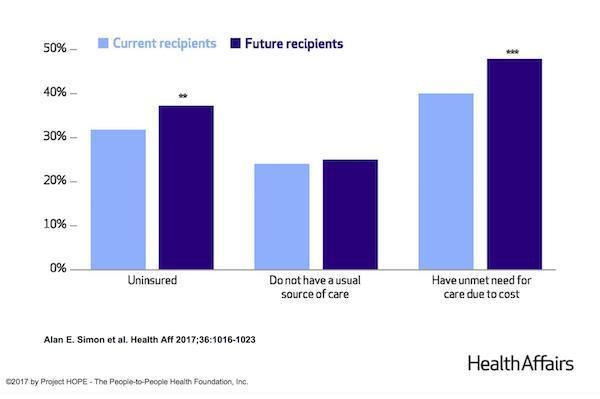Adjusted percentages of adults receiving HUD housing assistance who are uninsured, who do not have a usual source of care, and who have unmet need due to cost. Photo illustration courtesy Health Affairs
June 6 (UPI) -- A new study has found that people receiving subsidized housing assistance were more likely to have health insurance and less likely to have unmet medical needs.
Researchers at the University of Maryland School of Public Health analyzed data on adults age 18 to 64 from the National Health Interview Survey linked to the U.S. Department of Housing and Urban Development, or HUD, data from 2004 to 2012.
Housing assistance programs funded by HUD give low-income people with access to safe and affordable housing and studies show people who receive public housing subsidies are often in poor health and require mental health and chronic disease care.
"We found that the benefits of giving people subsidized housing go beyond simply having access to affordable housing. Housing is good in and of itself, but even better is that with improved access to housing, you get improvements in access to health care, and ultimately better health outcomes," Dr. Fenelon, an assistant professor in the UMD SPH Department of Health Services Administration, said in a press release.
The study showed that receiving HUD assistance was associated with lower uninsured rates.
The findings of the study are particularly relevant due to the Trump administration's proposed $6 billion cut to HUD in 2018. The Center on Budget and Policy Priorities, a non-partisan research organization, estimates the Trump proposal will result in the elimination of 250,000 rental vouchers under HUD.
"There are many reasons why having access to housing may enable people to obtain health insurance and access needed care," Fenelon said. "With the increased stability that comes from having a home and reduced financial burdens, and being introduced into the social service system and the access to other support services it provides, people receiving housing assistance are getting improved access to primary care health services. This is a clear demonstration that housing is one of the so-called 'social determinants' of health. The value of this program should be carefully considered in light of the far-reaching benefits it may have beyond its face value."
The study was published in the journal Health Affairs.















